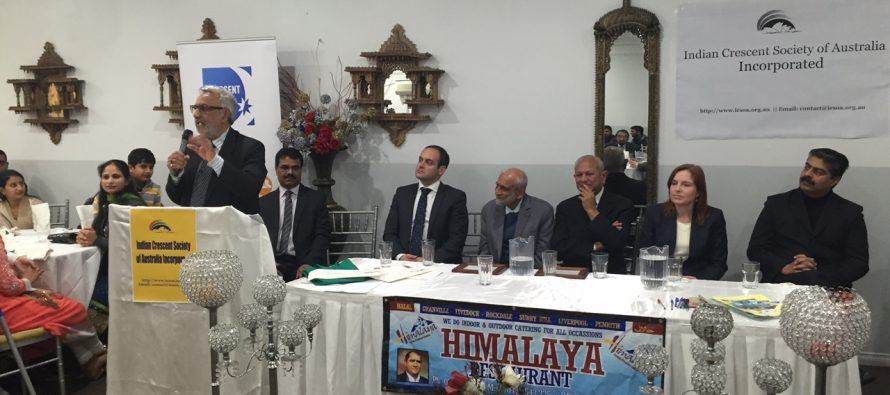The Arab Spring: Yemen
By Susan Schwartz, TMO
The Arab Spring that broke out in the Middle East early last year became the favorite news story of the media and ignited the imagination of the public. Seemingly forgotten – or at least consigned to a minor role – was the political upheaval in Yemen.
Yemen, located in the southwestern end of the Arabian peninsula is one of the oldest nations in the world. In recent decades South Yemen was a Marxist state and a Soviet satellite while North Yemen was independent. Shortly after the collapse of the Soviet Union, specifically in 1990, the two countries merged into the Republic of Yemen, albeit after years of clashing. In 1994 a civil war was fought ending the hopes of the South for separate nationhood.
In the early months of 2011 groups in Yemen, peopled by in many cases and certainly led by Yemeni youth, took a cue from Tunisia and Egypt and rallied against the 33 year reign of Ali Abdullah Saleh. He was persuaded to step down as part of a brokered arrangement by neighboring countries. What followed was expected to be a period of reform as a step to a democratic Yemen.
If Yemen was the stepchild of the Arab Spring, a group of young people set out to work for its betterment, one element of which was to acquaint the American public with Yemen, its people and its needs.
The Yemen Peace Project (YPP) was formed in 2010 by four young people who met while studying Arabic at the Yemen College of Middle Eastern Studies in San’a. If the revolution in Yemen was led by youth, then so were its champions in the United States.
The YPP was founded to acquaint the American people with the nation of Yemen and its needs. Last year during Ramadan, a Fast for Yemen was launched to raise money for field hospitals in Change Square (Sana’a) and Freedom Square in Ta’iz. One hundred percent of monies raised was delivered directly to the hospitals with no frictional losses.
In addition, the Los Angeles division has delivered several lectures—including a recent one at the Levantine Cultural Center—and hosted a photographic exhibit.
Of perhaps even greater importance the people of Yemen know that they have not been forgotten and that their needs and aspirations have been brought to the attention of the American people in a continuing educational effort.
One of the young leaders of the YPP, Will Picard, has agreed to be interviewed by The Muslim Observer.
Mr. Picard is the son of an attorney of international law who, during the 1990s, represented Yemen in a series of border disputes with its neighbors. Mr. Picard has lived and studied in Yemen as have the other founders of the YPP.
When discussing the manner in which the citizens of Yemen view their primary and secondary identities, Mr. Picard said that tribalism is much stronger in the north; in southern Yemen people still identify strongly with their regions, and sometimes with tribes, but it is a far less prominent feature of social organization than it is in the north. More importantly, it’s not tribalism that makes unity and progress difficult, it’s the corruption of the regime and the blatant repression of southerners, which has been a constant feature of Yemeni politics since unification.
The United States has not worked toward building the civil society needed in Yemen. Counter terrorism efforts have been our national priority resulting in a cruise missile strike that has killed women and children and further alienated the Yemeni people.
The Muslim Observer: Lets suppose that tomorrow you were appointed ambassador to Yemen. The President asks you what you would do for Yemen. What would your answer be?
Mr. Picard: The biggest problem in America’s relationship with Yemen today is the total lack of trust. The Obama administration has a decent relationship with President Hadi, but Yemenis, by and large, do not trust the United States; they see America’s policies as exploitive and destructive. This distrust can only be overcome with positive actions, but it has to start with honesty. America has to be open and honest with the Yemeni people about its goals and its interests. In the past two years we’ve seen the Yemeni populace rise up and demand to be included in political affairs; this popular mobilization must be met with popular engagement. As it stands, the US embassy in Yemen and the US Department of State have no public diplomacy effort to speak of. Effective communication with the people must be the first step in improving relations.
TMO: Please tell us of the groups in Yemen that you coordinate with.
Mr. Picard: We’ve worked with a few different groups in Yemen. In 2011, we coordinated with the House of Light Foundation in Aden to provide assistance to camps for people who had been displaced from their homes by fighting between the government and jihadi militants. We’re currently trying to help House of Light develop another major project in Aden. Last year we also raised money for the revolutionary field hospitals in San’a and Ta’iz. These hospitals, inside the protest encampments of those two cities, were established and staffed by volunteer doctors, nurses, and medics, and were funded solely by donations. The field hospital in San’a’s Change Square is still open, and provides free medical care to all.
For the most part we’ve worked with individual activists in Yemen. Some of these activists have helped us deliver funds to various causes. Others provided the photographs for our groundbreaking photography exhibition last year. And some have worked with us to establish our international pen-pal initiative, through which American and Yemeni youth gain first-hand knowledge about each other’s lives and societies.
TMO: It is acknowledged that there is a radical Islamic presence in Yemen. How does the average Yemeni regard them?
Mr. Picard: There is a wide variety of religiously-inspired activism in Yemen right now. Obviously militant jihadi groups like al-Qa’idah in the Arabian Peninsula (AQAP) and their affiliate group Ansar al-Shari’ah get the most attention in the western media, but they don’t represent the mainstream. Most Yemenis reject that kind of militant, reactionary ideology and the violence that goes with it. But anger toward the government is widespread, so it’s only natural that AQAP is able to recruit some people to their cause.
TMO: Would you describe the current condition of the revolutionary youth that were so instrumental in Yemen’s Arab Spring?
Mr. Picard: I think the two adjectives that best describe the revolutionary youth today are frustration and perseverance. They’ve succeeded in driving Ali Abdullah Saleh from the presidency, but none of their other original demands have been met. The international community has refused to listen to them, and Yemen’s political parties and other established factions have worked to co-opt and fragment the revolution. But even with these challenges, most of them remain committed to their goals, and are trying to find new ways to drive the revolution forward. The revolutionary youth stood fast in the face of Saleh’s thugs, snipers, and tanks; they won’t be discouraged by political bickering and elite power struggles. That said, they have a lot of work to do to figure out how to make their voices heard and establish themselves as permanent fixtures in the political scene.
TMO: Former President Saleh is still in Yemen and much of his entourage is still embedded. Can you describe what he has left behind and how it persists under now President Hadi?
Mr. Picard: Ali Abdullah Saleh has a great deal of personal wealth obtained over more than three decades of corruption and theft. He still has the loyalty of many in the ruling party he built. That party still has more than half of the seats in Yemen’s transitional government, and a great deal of informal power as well. His son, Ahmad, commands the Republican Guard, Yemen’s most well-funded military outfit; his nephew, Yahya, controls another powerful organization, the Central Security Forces. Though President Hadi is doing what he can to weaken these forces, and has removed other Saleh loyalists from military commands, Saleh’s influence is undeniable. What’s more, the international community—which claims to be dedicated to a successful transition in Yemen—is doing nothing to change this. President Obama issued an executive order threatening to freeze the assets of anyone interfering in the transition or defying President Hadi’s efforts, but that has turned out to be a completely empty gesture. Not a penny of Saleh’s wealth—in Yemen or overseas—has been touched.
14-40













2012
883 views
views
0
comments